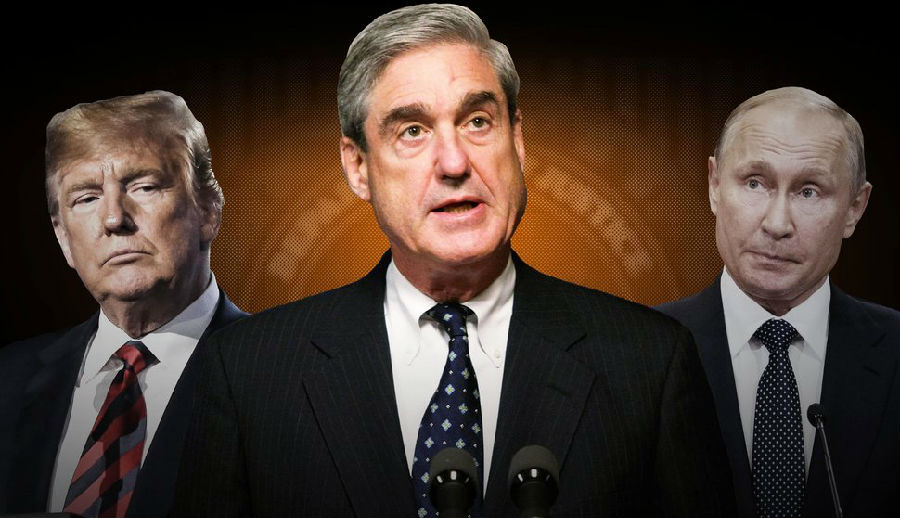What do Mueller’s inquiries for Trump tell us about his probe?
穆勒調(diào)查到底告訴了我們什么?
IN A TOWN NOTORIOUS FOR LEAKING,
在那個因泄密而臭名昭著的圈子里,
special counsel Robert Mueller’s team has been a striking exception to the rule.
特別檢察官羅伯特·穆勒的團(tuán)隊堪稱是例外中的例外。
Since launching its investigation last May into Russian meddling in the 2016 election,
自去年(2017年)5月啟動對俄羅斯干預(yù)美國2016年大選的調(diào)查以來,
the team of federal prosecutors has been tightlipped,
穆勒的這一聯(lián)邦檢察官團(tuán)隊的口風(fēng)一直很緊,
tipping its hand only when unveiling an indictment or announcing a guilty plea.
只有在公布起訴或宣布(某涉案人)認(rèn)罪時才會稍稍松口。
While the source of the April 30 leak has not been revealed,
盡管4月30日的泄密事件的源頭尚未被披露,
that made the more than four dozen questions Mueller’s office would like to ask President Trump especially revealing.
但這一事件還是讓穆勒辦公室想要問特朗普總統(tǒng)的四十多個問題顯得特別有啟發(fā)性。
The questions, which probe everything from the firings of former National Security Adviser Michael Flynn and FBI Director James Comey
這些問題,從解雇前國家安全顧問邁克爾·弗林和聯(lián)邦調(diào)查局局長詹姆斯·科米
to potential campaign coordination with Russia,
到為了競選疑與俄羅斯有合作無所不包,
represent the clearest indication yet about the focus and scope of the investigation as well as the perils it may pose to the President.
不僅是表明這次調(diào)查的重點和范圍的迄今為止最明確的線索,也顯示了這次調(diào)查可能給總統(tǒng)帶來怎樣的危險。
Prosecutors say the wording of the questions makes it clear
檢察官們表示,問題清單的措辭清楚地表明,
that the special counsel is particularly interested in whether Trump obstructed justice.
特別檢察官尤其關(guān)心的是特朗普是否存在妨礙司法公正的行為。
“Before there was a very rational expectation that there was a lot of focus on the obstruction issue,”
“且不說大家是否能理性地預(yù)料到我們會把大量的注意力放在這個問題上,”
says Preet Bharara, the former U.S. Attorney for the Southern District of New York who was removed by the Trump Administration last year after he refused to resign from his post.
去年因為拒絕辭職被特朗普政府解雇了的前紐約南區(qū)聯(lián)邦檢察官普里特·巴拉拉說到,
“If these are the questions they intend to put to the President directly, then it erases all doubt.”
“如果這些問題就是他們打算問總統(tǒng)的問題,那所有的疑點就都消散了。”
Mueller may never get the chance to ask them.
穆勒可能永遠(yuǎn)都不會有機會問這些問題。

Trump has said he would “l(fā)ove to” talk with Mueller under oath,
因為特朗普曾表示,雖然他很“樂意” 開誠布公地跟穆勒談,
but outside advisers and some of his own lawyers have advised him not to,
但外部顧問和他自己的一些律師都建議他不要這樣做,
with one warning ominously that it could be a “perjury trap.”
其中一位還警告他,這可能是一個“偽證陷阱”。
Giving misleading answers under oath was one of the reasons former President Bill Clinton was impeached.
畢竟,前總統(tǒng)比爾·克林頓被彈劾的原因之一就是他在宣誓后作出了誤導(dǎo)性的回答。
Trump responded to the leaked questions by claiming they vindicated him,
面對調(diào)查問題被泄,特朗普回應(yīng)說那些問題恰好證明了他的清白,
tweeting that there were no questions about collusion (there are, in fact, 13)
他在推特上說到,那些問題中并沒有關(guān)于共謀的問題(事實上,有13個),
and that it’s “very hard to obstruct justice for a crime that never happened.”
而且,“對于子虛烏有的罪行,阻礙司法公正是很難的。”
(Obstruction charges do not require that an underlying crime be proved.)
(阻礙司法公正的指控是不需要證明罪行屬實的。)
While the tweets show Trump’s current mind-set,
雖然這些推文揭示的是特朗普當(dāng)前的心態(tài),
many of the questions are focused on what Trump was thinking
但被泄的問題很多都集中在了川普
when he took action at important moments during his presidency, like firing Comey.
在他任期內(nèi)的重要時刻,比如解雇科米時的心理活動上。
That’s because intent is a key element of any obstruction charges—
這是因為任何阻礙司法公正指控中,意圖都是一個關(guān)鍵的因素——
which is why prosecutors say an interview with Trump is essential.
這也是檢察官們?yōu)槭裁凑f采訪特朗普是整個調(diào)查必不可少的一個環(huán)節(jié)的原因。
“One of the easiest ways to get to someone’s state of mind, to determine guilt or innocence, is to question them directly,” Bharara says.
“要了解一個人的思維活動,判斷TA是否有罪,最簡單的辦法就是直接詢問,”巴拉拉說到。
If the questions provide a road map for the Mueller inquiry,
如果這些問題能為穆勒的調(diào)查提供方向,
the interrogation might still go diferently if the President ever decides to sit down with the special counsel.
要是總統(tǒng)真的決定和特別檢察官(穆勒)坐下來面談,審訊的情況可能還是會變得不一樣。
“These strike me as a proxy, even though they’re very specific, for areas they might want to explore,” Bharara says.
“這些問題還是讓我覺得只是表象,盡管已經(jīng)很具體了,他們真正想問的問題可能還在這些問題的背后,”巴拉拉說:
“I don’t think these are precisely the questions that are gonna be asked.”
“我不認(rèn)為這些問題就是將要被問到的問題。”
譯文由可可原創(chuàng),僅供學(xué)習(xí)交流使用,未經(jīng)許可請勿轉(zhuǎn)載。


